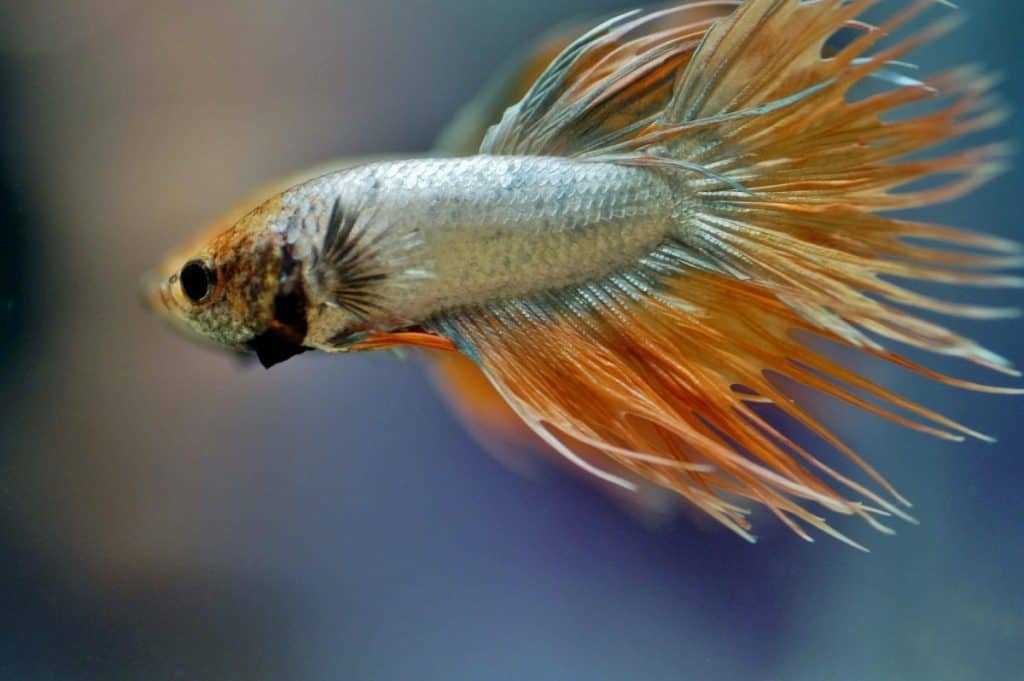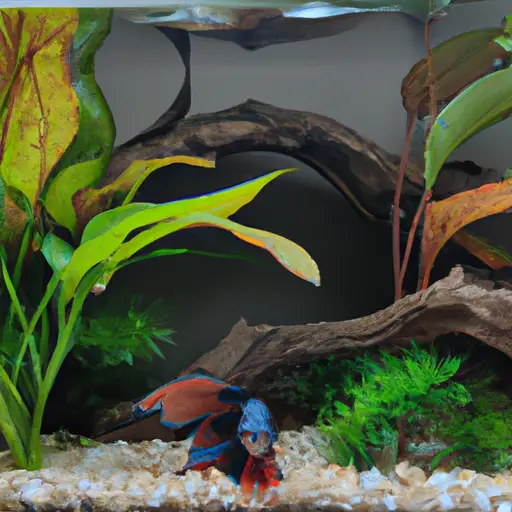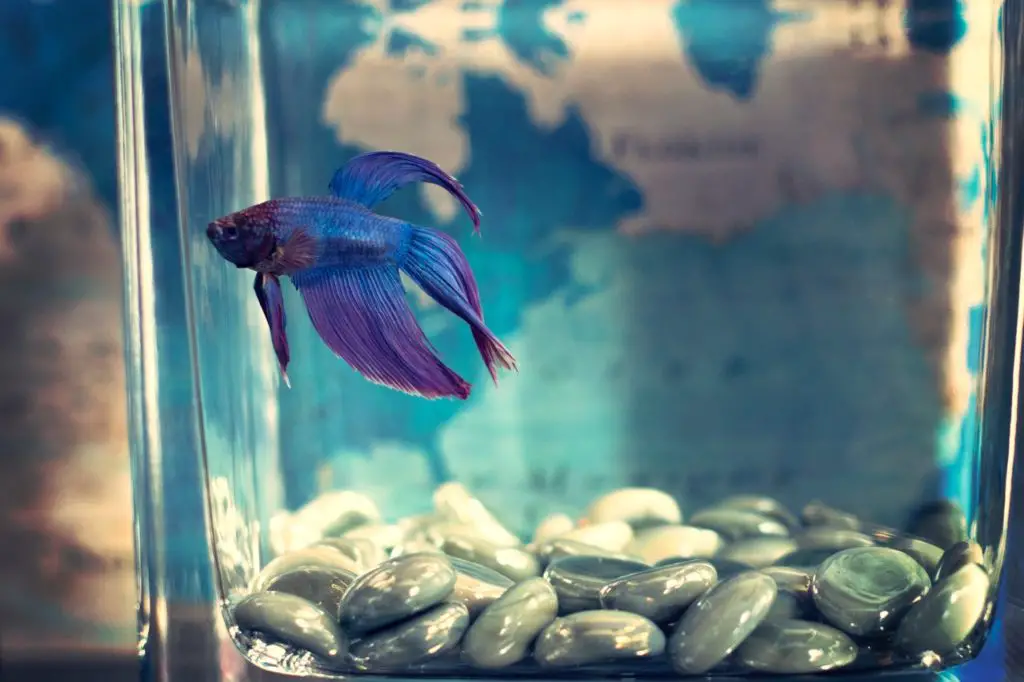Betta fish, also known as Siamese fighting fish, have unique physiology and dietary needs that are important to understand to keep them healthy and happy. In this article, we will answer the question, “how often do you need to feed betta fish?” and provide some general guidelines for feeding your betta fish the right amount and type of food.
How Often Do You Need to Feed Betta Fish?
Betta fish should be fed once or twice a day, with each meal consisting of a small amount of food they can consume in a few minutes. It is important to feed betta fish sparingly, as they have a small stomachs and can quickly become overweight or develop health problems from overeating.
Providing a balanced and varied diet that includes protein-rich foods and plant-based foods, such as bloodworms, brine shrimp, and high-quality pellets or flakes, is also important.
Several factors can affect how often you should feed your betta fish, including the fish’s age, size, activity level, and the type and quality of the food you are feeding them.
- Age: Young betta fish, or fry, have higher energy needs and will require more frequent feedings than adult betta fish. Feeding fry several times a day is generally recommended, with each meal consisting of a small amount of high-quality, protein-rich food, such as baby brine shrimp or finely ground pellets. As the fry grows and matures, you can gradually reduce its feeding frequency to once or twice a day.
- Size: Betta fish come in various sizes, with males generally larger than females. Larger betta fish will require more food than smaller fish, so their feeding frequency may need to be adjusted accordingly. It is important to monitor your betta fish’s body condition and adjust their feeding frequency and portion size to prevent them from becoming overweight or underweight.
- Activity level: Betta fish are naturally active and playful, and they will burn more calories and require more food if they are engaged in regular exercise and play. Fish that are kept in larger tanks or tanks with plenty of hiding spots and accessories for them to explore and interact with may require more frequent feedings than fish that are kept in smaller, bare tanks with limited space for movement.
- Food type and quality: The type and quality of the food you feed your betta fish can also affect their feeding frequency. High-quality, nutrient-rich foods are more easily and quickly digested by betta fish, providing them with the energy and nutrients they need without overloading their digestive system. Feeding your betta fish a varied diet that includes both protein-rich and plant-based foods can help ensure that they get the nutrients they need and can help prevent overfeeding and obesity.

The Dos and Don’ts of Feeding Betta Fish
When it comes to feeding betta fish, there are a few dos and don’ts that are important to keep in mind.
The Dos of Feeding Betta Fish Include:
- Using the correct type of food: Betta fish are carnivorous, which means they need a diet rich in protein and other nutrients. High-quality, protein-rich foods, such as bloodworms, brine shrimp, and pellets or flakes specifically designed for betta fish, are ideal. Avoid feeding your betta fish low-quality, generic food or food not specifically intended for bettas.
- Providing variety in their diet: Betta fish thrive on a varied diet that includes protein-rich and plant-based foods. Mixing up the types of food you offer and providing various flavors and textures can help keep your betta fish happy and healthy.
The Don’ts of Feeding Betta Fish Include:
- Feeding too much or too often: Overfeeding can lead to health problems for betta fish, such as bloating, constipation, and bacterial infections. It is essential to stick to the recommended feeding frequency and portion size for your betta fish and to avoid overfeeding them.
- Feeding the wrong type of food: Betta fish are carnivorous and need a diet that is rich in protein. Avoid feeding your betta fish low-quality, generic food or food not specifically designed for bettas.
- Need to provide more variety: Betta fish thrive on a varied diet that includes protein-rich and plant-based foods. Not providing enough variety in their diet can lead to nutrient deficiencies and other health problems. Mix up the types of food you offer and provide various flavors and textures to keep your betta fish happy and healthy.

The Effects of Overfeeding on Betta Fish
I think the biggest risk to the health of aquarium fish, in general, is overfeeding.
Overfeeding can lead to many health problems for betta fish, including bloating, constipation, and bacterial infections.
- Bloating: Betta fish have small stomachs and can quickly become bloated if they overeat. This can cause discomfort and even death if left untreated. Bloating can be caused by overfeeding, feeding the wrong type of food, or feeding too often.
- Constipation: Overfeeding can also lead to constipation in betta fish. Constipation can be caused by a lack of fiber in the diet or by feeding your betta fish too much food at once. If left untreated, constipation can cause discomfort and lead to more severe health problems.
- Bacterial infections: Overfeeding can also lead to bacterial infections in betta fish. Bacteria thrive in the warm, moist environment of a betta fish’s digestive system, and overfeeding can create an ideal environment for bacterial growth. Bacterial infections can cause various symptoms, including loss of appetite, lethargy, and difficulty breathing, and can be challenging to treat.
Monitoring your betta fish’s body condition is essential to prevent these health problems. You should adjust their feeding frequency and portion size as needed, and this can help prevent overfeeding and keep your betta fish healthy and happy.

Conclusion
In conclusion, feeding betta fish the right amount and type of food are essential for their health and happiness. Some key points to remember to include the following:
- Betta fish should be fed once or twice a day, with each meal containing a small amount of high-quality, protein-rich food.
- Avoid overfeeding your betta fish and provide a balanced and varied diet that includes protein-rich and plant-based foods.
- Monitor your betta fish’s body condition and adjust their feeding frequency and portion size to prevent overfeeding and obesity.
It is also essential to research and consult with a veterinarian or experienced betta fish owner for specific feeding advice for your fish. Every betta fish is unique, and its dietary needs may vary based on factors such as its age, size, and activity level. By taking the time to understand your betta fish’s needs and providing them with the right food and feeding frequency, you can help ensure their long-term health and happiness.
